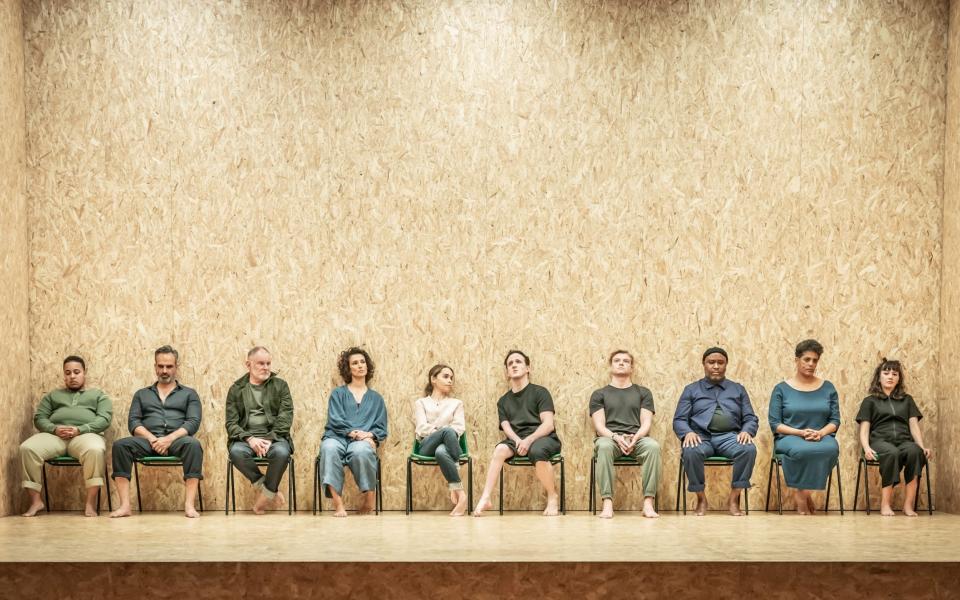The Seagull, review: Emelia Clarke’s wings are clipped by this ascetic Chekhov staging

Prior to the pandemic, Jamie Lloyd, puckish purveyor of “event theatre”, gave us one of the most arresting productions of recent times with a stripped-back, casually dressed Cyrano de Bergerac starring James McAvoy that featured, near scandalously, no “nose”. The accent instead was on the peppy spoken word, the thrust being to interrogate the power of the mind, and the eye of the beholder.
Now, in a Covid-delayed follow-up, Lloyd, 41, attempts a similarly audacious experimental assault on an even better-known classic, Chekhov’s The Seagull, in a production that wings erstwhile Game of Thrones star Emilia Clarke to the West End stage for the first time. Clarke takes the role of Nina, the aspiring actress who breaks the heart of the infatuated tyro playwright Konstantin by falling for his actress mother’s successful writer lover, Trigorin, but herself winds up wretched, identified, in a curious, symbolic way, with a dead seagull.
Lloyd has gone for broke with a no-frills approach. The décor is more negligible than minimal: a spartan, unsightly chipboard backdrop banishes the expected rusticity. Movement is restricted: the cast mainly sit, or slouch, on shifted-about rows of green plastic seats, under harsh bright lights. They tend to look out more at us than each other; there are no exits and entrances, everyone’s in the “room”, creating claustrophobia with shades of a read-through. The actors, mic’d, are downbeat, like attendees at a clinic, or people who’ve spent so long staring at their phones they’ve lost the art of conviviality.
Messing with Chekhov isn’t new; indeed, Lloyd utilises a modern-ish adaptation by Anya Reiss that was admired on the fringe a decade ago, but has been tinkered with here, stripping away topical or geographical references, wildly splicing scenes.
Clearly, there’s a worthy impulse in all this of striving to emulate the surprise factor and novel self-reflexive qualities the play had in 1896. It swept away melodramatic conventions (mostly) and offered a fresh naturalism that answered the elusive interplay of everyday exchanges, along with an awareness, via Konstantin’s ethereal playlet, that each generation will demand radical artistic change.

In abstract terms, the approach hangs together and yet, in contrast with Cyrano, it feels unsatisfying to watch, self-negating. Cutting Konstantin’s grandiose opus, and cutting at the start to his mother Arkadina’s criticism of it as an overblown trifle, weakens the comedy, diminishes the way their psychodrama struggle is played out in rival theatrical styles, and removes Nina’s opening speeches.
Given Jodie Comer’s recent tour de force here, it’s a pity we can’t see more what Clarke is made of. She was imposing in Game of Thrones (as Daenerys Targaryen, lover of Jon Snow, mother of dragons etc), but here she’s a wallflower, lots of cheerleader smiles, appreciative glances – directed at Tom Rhys Harries’s dishy, gauche Trigorin – and wistful looks, nuzzlingly sharing a chair near the end with Daniel Monks’s hushed, tender, irremediably unhappy Konstantin.
Only the most deluded GoT devotee would expect adrenal action, but wouldn’t many fans want a show with a bit more fire in its belly than this? And might those unfamiliar with the play not feel lost, inadequate?
In so far as they go, constrained by a directorial conceit so sparing it’s distractingly ostentatious, I can’t fault the cast, but they yield little that couldn’t be obtained in more traditional, pleasure-giving Chekhov. As Arkadina, Indira Varma, another GoT alumna, is winningly withering and subtly vain. Robert Glenister is quietly magnificent too as her brother Sorin, rumbling, sad, profound even in his flip asides, while Gerald Kyd’s Dorn exudes such laid-back sexual charisma, he seems springy even when most sedentary, drolly prescribing a dose of paracetamol for the spiritual ache of mortality.
Whether this is just what doctor Chekhov would have ordered, who knows? But it’s too static and sapping, in these joy-starved times, to prescribe.
Until Sept 10. Tickets: 03330 096 690; haroldpintertheatre.co.uk

 Yahoo News
Yahoo News 
